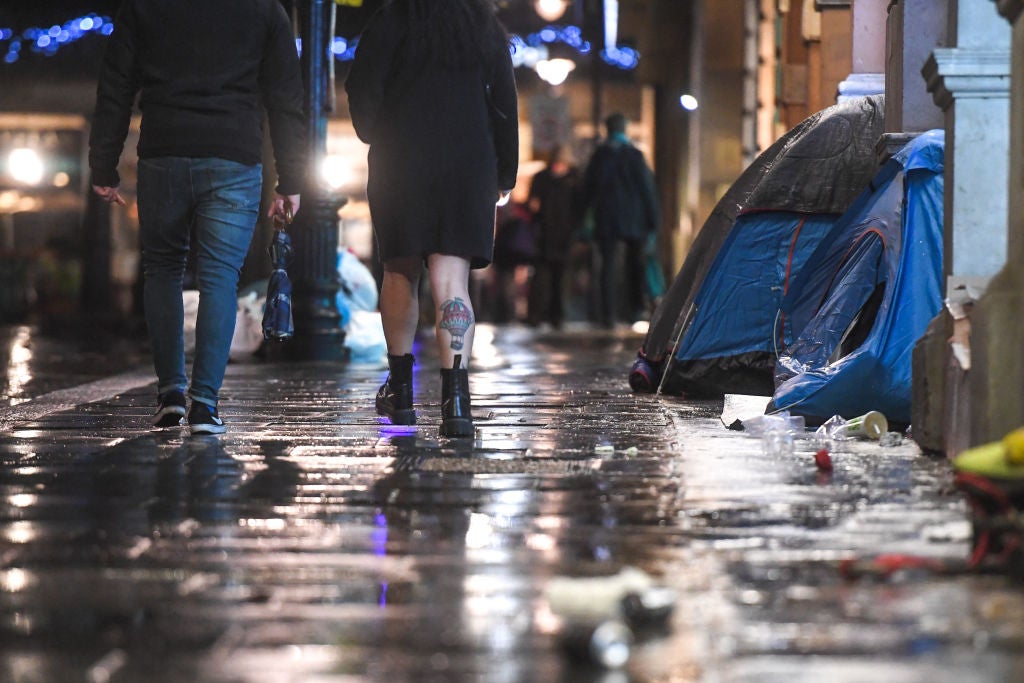Lives will be lost if Boris Johnson fails to restart the Everyone In scheme
High Covid-19 numbers and extreme cold weather are putting rough sleepers at serious risk – the government must act now

Your support helps us to tell the story
From reproductive rights to climate change to Big Tech, The Independent is on the ground when the story is developing. Whether it's investigating the financials of Elon Musk's pro-Trump PAC or producing our latest documentary, 'The A Word', which shines a light on the American women fighting for reproductive rights, we know how important it is to parse out the facts from the messaging.
At such a critical moment in US history, we need reporters on the ground. Your donation allows us to keep sending journalists to speak to both sides of the story.
The Independent is trusted by Americans across the entire political spectrum. And unlike many other quality news outlets, we choose not to lock Americans out of our reporting and analysis with paywalls. We believe quality journalism should be available to everyone, paid for by those who can afford it.
Your support makes all the difference.The “Everyone In” initiative, implemented during the first wave of the Covid-19 virus, took tens of thousands of rough sleepers off the streets and helped them start the transition into more secure and long-term accommodation.
In the space of just 72 hours, this ambitious programme took thousands of people off the streets. It saved lives and shattered the illusion that homelessness is an intractable problem to solve.
Since then, Boris Johnson’s government has noticeably scaled-back its ambitions. It insists that the Everyone In programme has continued to support rough sleepers – and while it is true that many people helped in the first lockdown have now been moved into more permanent accommodation, lives are still at risk and too many people remain on the streets.
As you read this article, thousands of people sleeping rough are being exposed to unbearably cold conditions, as well as Covid-19. This makes them extremely likely to become ill, at a time when the NHS is already teetering on the brink of being overwhelmed.
As the temperature plummets, local authorities are activating their Severe Weather Emergency Protocol, which provides emergency accommodation for rough sleepers on extremely cold winter nights. This will offer temporary relief to those sleeping rough, but it will only last as long as temperatures remain below freezing.
A renewed focus on ending homelessness for good is needed to ensure homeless people who are taken indoors can be offered support to transition into permanent accommodation. However, without the resources they need, already stretched local councils will be unable to assist everyone and cannot provide long-term solutions.
The government claims that it is continuing efforts to help people off the streets and a recent announcement has outlined its next steps to help rough sleepers this winter. However, these plans are far less ambitious than the programme of help offered last spring.
The housing secretary, Robert Jenrick, has asked local councils in England to “redouble” their efforts to take people off the streets. But councils are being asked to do too much with too little. They are unable to help all those sleeping rough, let alone prevent new cases of homelessness occurring. The £10m in financial support on offer to councils falls far short of what is needed. It is also money that will be allocated from an existing pot of £700m. In 2018, the homelessness charity Crisis estimated that it would cost approximately £10bn to end homelessness for good. The government’s total spending to date is a fraction of this.
Over the course of the pandemic, 70,000 households have found themselves homeless. An even larger number are now at risk of homelessness, with unemployment in the north of England at its highest level for 25 years. The government’s efforts are only slowing the tide and are far removed from the hopes of spring that homelessness might one day be a problem of the past. Ending homelessness for good requires not just helping those who need it now. It means preventing it from occurring in the first place. However, homelessness and its causes have only worsened over the course of the pandemic.
New analysis conducted by IPPR North for this article shows that the north has a significantly higher proportion of renters struggling with arrears compared to other parts of England. In Yorkshire and the Humber, 14 per cent of renters were in arrears during the summer, more than any other English region and higher than the England average of 10 per cent. Evictions due to arrears are a leading cause of homelessness. Without action to help renters clear their debt and keep people in their homes, thousands more people across England, and particularly the north, could find themselves newly homeless during the current lockdown.
Boris Johnson has said he is determined to prevent homelessness and end rough sleeping once and for all. Rishi Sunak has also promised to do “whatever it takes” during this pandemic to protect people. Yet without further action, their legacy will be one of rising homelessness. Without a new ambitious Everyone In initiative to save lives this winter, and without a credible plan to end homelessness for good, the government’s promises will be left in tatters.
Jonathan Webb is a senior research fellow at thinktank IPPR North



Join our commenting forum
Join thought-provoking conversations, follow other Independent readers and see their replies
Comments